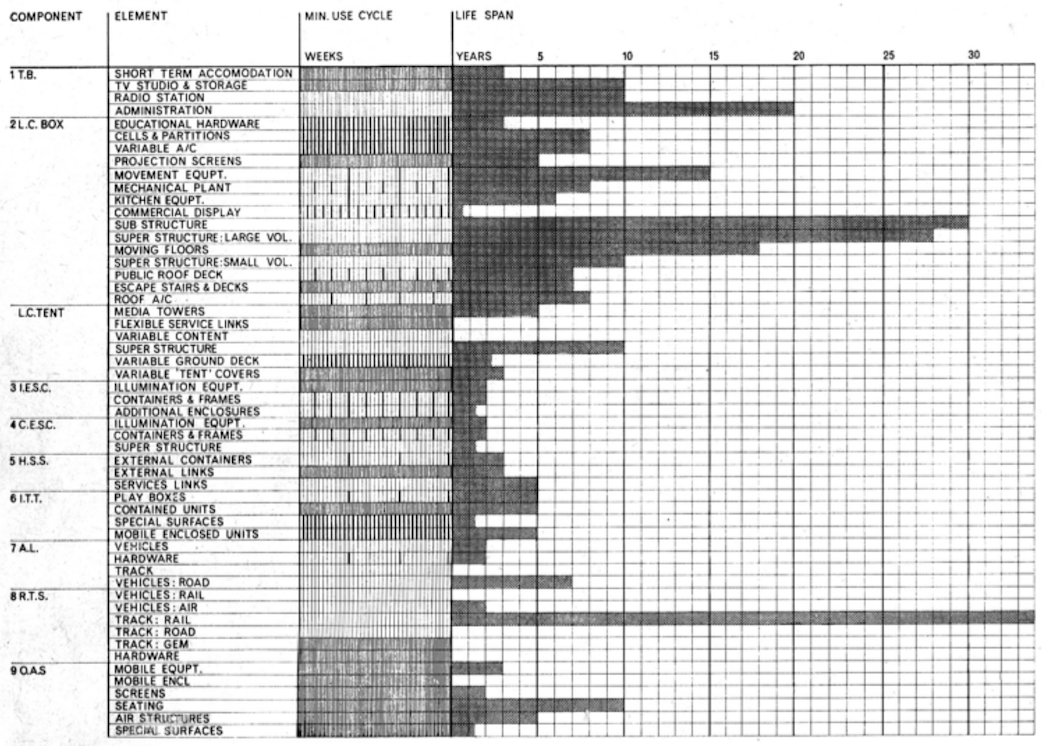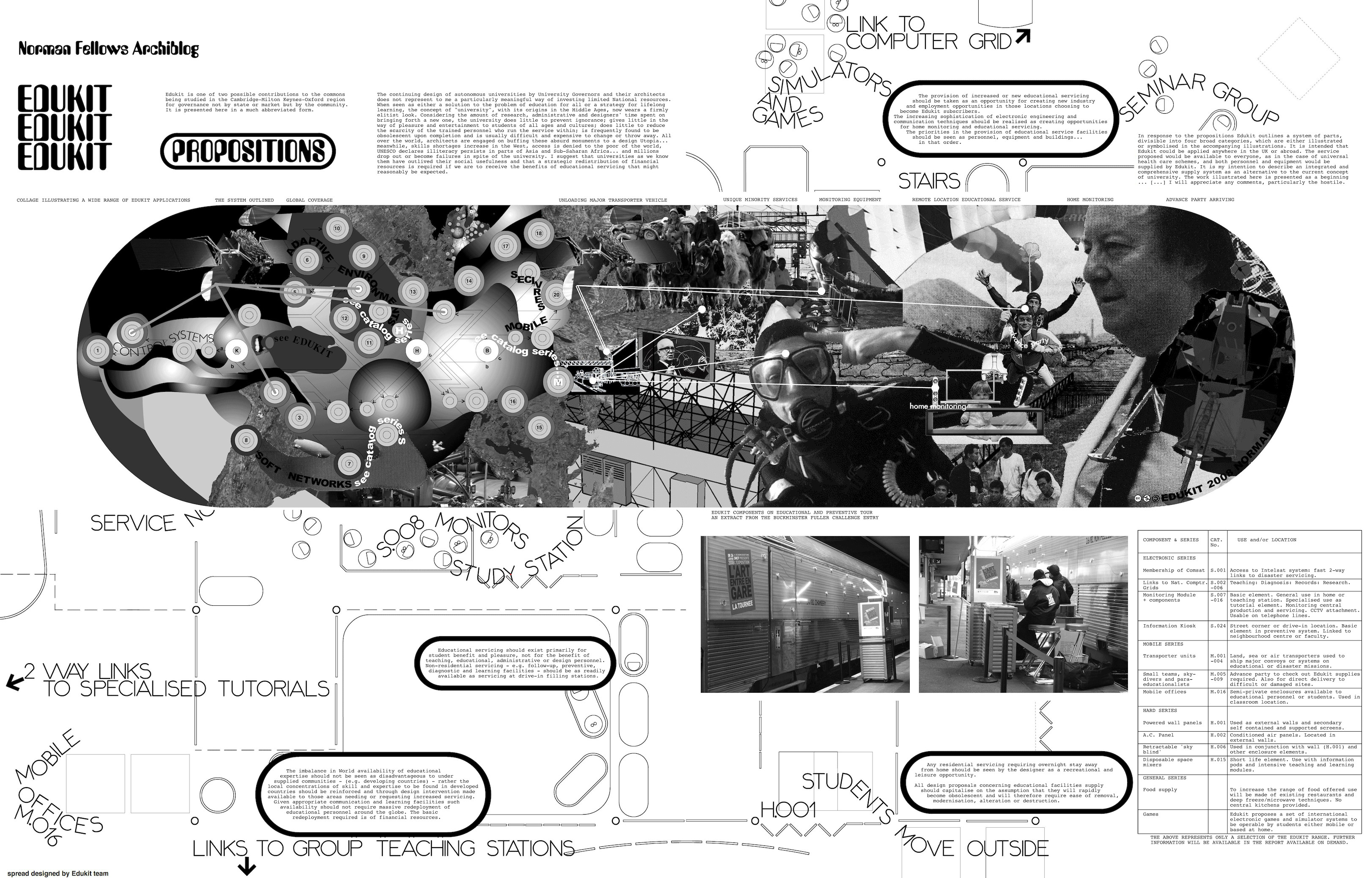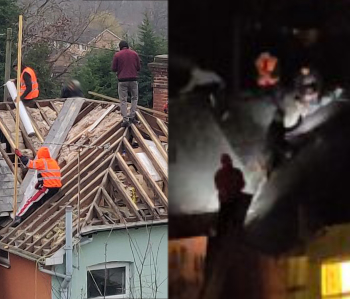Disaster Planning: School Buildings
 • A taped off section inside a primary school in Leicester - Photo credit: Jacob King
• A taped off section inside a primary school in Leicester - Photo credit: Jacob King
This article develops a theme established by Cedric Price, namely:—
- "that the buildings and fittings normally associated with the provision of educational facilities are not good enough, and that it is no longer a question of improvement but of re-think."
- (Price, 1968, Learning, AD 5/68)
[edit] INTRODUCTION
This is the third in a series of articles by Norman Fellows about Disaster Planning.
The first, entitled 'Disaster Planning', has been made even more prescient by the recent earthquake in Morocco and the landslides in Himachal Pradesh, India. [1]
The second, entitled 'Disaster Planning: North Staffs', focusses on buildings in a former coalfield. [2]
This third article recognises another set of potential disasters, namely:—
It is based on the observation:—
- ... that successive Governments have failed to recognise school buildings as a set of potential disasters.
In contrast, there is a view:—
- ... that only when school buildings are recognised as a set of potential disasters will the necessary legislation and management enable disaster planning to afford sufficient anticipatory design effort and product.
- (after Cedric Price, AD 10/70).
Thus this article is based on two premises, namely:—
- ... that there is a dominant narrative;
- ... that there is a counter narrative.
Its purpose is:—
[edit] A DOMINANT NARRATIVE
- "Dominant narrative can be used to describe the lens in which history is told by the perspective of the dominant culture. This term has been described as an "invisible hand" that guides reality and perceived reality. [...] It is a common theme to hear or learn only about the dominant narrative as it comprises the perspective of the majority culture."
- (Unattributed, Wikipedia).
A dominant narrative about school buildings can be found in countries all over the world. For example, in England:—
|
• Table 1: Chronological development of the dominant narrative about school buildings.
The evidence presented in Table 1 indicates a gradual shift in the dominant narrative about school buildings from a belief in their appropriateness as both physical and social institutions to a recognition that school buildings are not good enough. However, this recognition is confined to finding faults with particular physical elements - e.g. RAAC roofs - not with the design and construction of school buildings as a whole. Nor does it address the question of whether or not school buildings are an appropriate way of housing education in the 21st century - i.e. a re-think.
Thus this article finds:—
- ... that the Government controls the dominant narrative about school buildings;
- ... that the dominant narrative evidenced in Table 1 excludes counter narratives;
- ... that neither the Government nor the authors of the articles recognise school buildings as a set of potential disasters.
In other words, according to its official narrative:—
THE GOVERNMENT DOES NOT RECOGNISE SCHOOL BUILDINGS AS A SET OF POTENTIAL DISASTERS.
However, given the current state of the School Estate and the condition of school buildings, this article argues:—
- ... that a counter narrative is urgently required.
[edit] A COUNTER NARRATIVE
- "a narrative that goes against another narrative."
- (Unattributed, Wordnik).
A counter narrative which goes against the dominant narrative about school buildings evidenced in Table 1 was introduced by Cedric Price in May 1968. For example:—
• Fig. 18: Edukit spread, 2015+
The second contribution takes the May 1968 issue of AD as a starting point (see 2018 below). Thus this counter narrative argues:—
|
• Table 2: Chronological development of a counter narrative about school buildings.
The evidence presented in Table 2 develops the counter narrative introduced by Cedric Price in May 1968 from its original position to a new one.
Thus this article finds:—
- ... that a counter narrative is possible;
- ... that the counter narrative evidenced in Table 2 poses a challenge to the dominant narrative about school buildings;
- ... that it is no longer a question of improvement but of re-think.
However, it is incomplete:—
THE LEGISLATION AND MANAGEMENT DEEMED NECESSARY TO ENABLE DISASTER PLANNING TO AFFORD SUFFICIENT ANTICIPATORY DESIGN EFFORT AND PRODUCT ARE MISSING.
[edit] CONCLUSION
Firstly, this article affirms its two premises. It also shows:—
- ... that both the Government and the authors of the articles realise that school buildings are not good enough;
- ... that neither of them understand that it is no longer a question of improvement but of re-think.
Thus this article concludes:—
- ... that the counter narrative introduced by Cedric Price advocates a re-think about school buildings;
- ... that it is incomplete;
- ... that it requires a reiteration.
What next? Perhaps a dedicated website?
[edit] Notes
[1] Fellows, N. (2022) 'Disaster Planning', Designing Buildings.
[2] Fellows, N. (2022) 'Disaster Planning: North Staffs', Designing Buildings.
[3] Crawford, A. (2023) 'School buildings on the brink – A disaster waiting to happen', socialist.net, Tuesday 1 August and Labour Research (2023) 'School buildings 'a disaster waiting to happen'', Labour Research Department, Monday September 4 have both described school buildings as "a disaster waiting to happen".
[4] Ministry of Education (1957) 'The story of post-war school building (1957)', HMSO.
[5] Unattributed (2023) 'Consortium of Local Authorities Special Programme', Wikipedia.
[6] Awaiting further information from the RIBA Library department.
[7] Unattributed (2023) 'Warning Raac schools crisis could be 'tip of the iceberg' amid calls for national risk register', itvNEWS.
[8] Unattributed (2023) 'British MPs debate a crisis over school buildings. Childishly', The Economist, Wednesday, 6
September.
[9] Velikov, K. (2015) 'Tuning Up the City - Cedric Price's Detroit Think Grid', ResearchGate.
[10] Fellows, N. (2015) ''THE FULLER CHALLENGE: My First Submission' by Norman Fellows', in 'Beyond Supercrit #1: CP: PTb' on Blogger.
[11] Fellows, N. (2017) 'What are social goods? What is the commons?', Extremely Provocative on Wordpress.com.
[edit] External references
[edit] • Articles published before 30 August 2023
Ministry of Education (1957) 'The story of post-war school building (1957)', HMSO.
Currie, R. J. and Matthews, S. L. (1996) 'Reinforced autoclaved aerated concrete planks designed before 1980', Information Paper 10/96, Building Research Establishment.
Walker, D. (2002) 'Summed up', The Guardian, Friday, 20 July, 18:07 BST.
UK Parliament (2004) '"Building Schools For The Future"', Hansard, Volume 418: debated on Tuesday 9 March.
Richardson, H. (2010) 'School buildings scheme scrapped', BBC, Monday, 8 July.
Mahony, P., Hextall, I. and Richardson, M. (2011) '‘Building Schools for the Future’: reflections on a new social architecture', Journal of Education Policy Volume 26, 2011 - Issue 3.
Mahony, P., and Hextall, I. (2013) ''Building Schools for the Future': 'Transformation' for social justice or expensive blunder?', British Educational Research Journal 39 (5), ResearchGate.
Design and Build (c2018) 'The state of the school estate', Education Business.
Roberts, J. (2018) 'Exclusive: 70% of school buildings ‘not fit for purpose’, Tes.
Nickalls, A. (2018) 'Singlewell Primary School, Gravesend, closed tomorrow after ceiling collapse', KentOnline, Sunday, 8 July, 12:47 GMT.
Adams, R. (2021) 'Repair bill for schools in England doubles to over £11bn, finds survey', The Guardian, Thursday, 27 May, 20:05 BST.
Adams, R. (2021) 'England’s £11bn school repair bill goes back to Michael Gove cuts', The Guardian, Thursday, 27 May, 20:15 BST.
Savage, M. (2022) 'Headteachers fight for funds to shore up England’s dilapidated classrooms', The Observer, Sunday, 14 May, 20:00 BST.
Loughborough University (2023) 'Expert explainer: What is Reinforced Autoclaved Aerated Concrete (RAAC) and why are people concerned about it?', lboro.com, 7 March.
Hewitt, D. (2023) 'Children at risk in schools where concrete could collapse 'with no warning', itvX, Thursday, 16 March 19:02 GMT.
UK Parliament (2023) 'School Buildings: Safety', Hansard, Volume 831: debated on Tuesday 20 June.
Standley, N. and Evans, A. (2023) 'Estimated 700,000 pupils in unsafe or ageing schools in England, says watchdog', BBC, Wednesday, 28 June.
Unattributed (2023) 'Deteriorating school buildings across UK pose 'critical' risk to pupils, watchdog says', itvx, Wednesday, 28 June 2023 22:41 BTS.
Crawford, A. (2023) 'School buildings on the brink – A disaster waiting to happen', socialist.net, Tuesday 1 August.
[edit] • Articles published from 30 August 2023 onwards
KEY ► Articles which used the term "crisis".
Adams, R. (2023) 'Schools in England told to be ready to evacuate buildings at risk of collapse', The Guardian, Thursday, 30 August, 13:18 BST.
Unattributed (2023) 'Pupils face schools turmoil over government’s inaction on building safety, says UNISON', Unison, Thursday, 31 August.
Norden, J. (2023) 'More than 100 schools advised to close buildings due to concrete risk', TES, Thursday, 31 August, 14:27 BST.
Booth, R. (2023) 'Crumble-risk concrete is latest upheaval to hit England’s schools', The Guardian, Thursday, 31 August, 18:45 BST.
Booth, R., Walker, P. and Adams, R. (2023) 'English schools told to close buildings made with crumble-risk concrete', The Guardian, Thursday, 31 August, 15:23 BST.
Booth, R., Walker, P. and Adams, R. (2023) 'Thousands of pupils may have to start term online as over 100 schools affected by crumble-risk concrete', The Guardian, Thursday, 31 August, 19:02 BST.
Worth, D. (2023) 'RAAC and school collapse risks: DfE guidance', TES, Thursday, 31 August, 17:28 BST.
►Smith, C. (2023) 'RAAC – What the concrete crisis tells us about politicians’ priorities', teachwire.net, exact date unknown.
►Unattributed (2023) 'School concrete crisis: Your questions answered', BBC, Friday, 1 September.
►Lowe, T., Gayne, D. and Lane, T (2023) 'The RAAC schools crisis: what we know so far', Building, Friday, 1 September.
Butler, A. (2023) 'The RAAC concrete ‘ticking time bomb’ that schools were warned about years ago', The Independent, Saturday, 2 September, 11:18 BST.
Syal, R., Quinn, B. and Adams, R. (2023) 'Jeremy Hunt under fire after Treasury says no new cash to fix Raac in schools', The Guardian, Sunday, 3 September, 19:37 BST.
►Unattributed (2023) 'Schools concrete crisis: We are taking deliberately cautious approach, says Gillian Keegan', The Telegraph, Monday, 4 September, 19.03 BST.
Labour Research (2023) 'School buildings 'a disaster waiting to happen'', Labour Research Department, Monday September 4.
PA Media (2023) 'Which schools in England and Wales are affected by Raac concrete?', The Guardian, Monday, 4 September, 14:42 BST.
Walker, P. (2023) 'Sunak refused to fully fund repairs of England’s crumbling schools, says ex-official', The Guardian, Monday, 4 September, 16:45 BST.
►Booth, R. (2023) 'Raac crisis: who knew what and when about crumbling concrete in England', The Guardian, Monday, 4 September, 11:49 BST.
Wickham, A (2023) 'Sunak Blocked Bid to Fix Crumbling UK Schools, Minister Says', Bloomberg, Tuesday, September 5, 09:52 GMT+2.
The Washington Post (2023) 'Schools in England could collapse due to weak concrete: What to know', Tuesday, 5 September, 10:03 EDT.
►Tetzlaff-Deas, B. (2023) 'RAAC concrete crisis: The full timeline of how the disaster made our schools unsafe', Mirror, Tuesday, 5 September, 13:27, GMT.
►Robinson, M. (2023) 'School concrete crisis deepens as primary warns disruption could last until 2025 and parents across the UK are told buildings will remain shut until further notice and children must stay home - just HOURS before the start of term', Daily Mail, Tuesday, 5 September, 16:39 BST.
►Porter, A. (2023) 'RAAC scandal: Companies accused of taking advantage of concrete crisis in schools and raising prices', sky news, Tuesday, 5 September, 19:55, GMT.
Walker, P. and Allegretti, A. (2023) 'More than half of dilapidated English schools were refused rebuilding money', The Guardian, Tuesday, 5 September, 20:32 BST.
►Booth, R. (2023) 'Price of fixing school concrete crisis in England ‘approaching £150m’', The Guardian, Wednesday, 6 September, 05:00 BST.
Reuben, A. and Cuffe, R. (2023) 'RAAC: How long have we known about unsafe concrete in schools?', BBC, Wednesday, 6 September.
►Robinson, J. (2023) 'RAAC crisis: Return of pandemic-style home learning for unsafe concrete schools should last 'days, not weeks'', sky news, Wednesday, 6 September, 10:13, GMT.
Finnis, A. (2023) 'Why was RAAC used? When schools were first built from aerated concrete and how many are affected', inews, 6 September 6, 12:34 GMT.
►Manning, E. and McGuinness, R. (2023) 'Revealed: Full list of schools affected by concrete crisis – and which ones have been closed', yahoo!news, Wednesday, 6 September, 13:26 GMT.
Rolph, C. (2023) 'Raac in UK schools: how poor funding and missing data led to closures', The Conversation, Wednesday, 6 September, 14:07 CEST.
Goodier, C. (2023) 'The good news? Raac isn’t always dangerous. The bad news: it’s not just in schools', The Guardian, Wednesday, 6 September, 15:29 BST.
►Unattributed (2023) 'British MPs debate a crisis over school buildings. Childishly', The Economist, Wednesday, 6 September.
Duncan, P. and Garcia, A.C. (2023) 'Schools in England affected by Raac: the full government list', The Guardian, Wednesday, 6 September, 15:52 BST.
►Garcia, A.C., Duncan P., Quinn, B. and Carrell, S. (2023)) 'Three-quarters of schools hit by concrete crisis are in Tory areas', The Guardian, Wednesday, 6 September, 18:07 BST.
►Nevett, J. (2023) 'RAAC crisis: Sunak defends school record after cowboy-builder jibe', BBC Politics, Wednesday, 6 September.
Unatttributed (2023) 'RAAC - RIBA's response', RIBA Architecture.com, 7 September.
►Hirons, P. (2023) 'RAAC concrete schools crisis: nine questions architects need answers to', RIBA Architecture.com, 7 September.
►Unattributed (2023) 'Warning Raac schools crisis could be 'tip of the iceberg' amid calls for national risk register', itvNEWS, Thursday 7 September 2023 at 16:15, GMT.
►Sagaseta, J. (2023) 'School concrete crisis: How Raac has been used well beyond its expiry date', The Conversation, Thursday, 7 September, 17:18 CEST.
►Sagaseta, J. (2023) 'School concrete crisis: How Raac has been used well beyond its expiry date', Techxplore, Friday.
Fazackerley, A. (2023) 'UK government did not carry out detailed surveys before it bought free schools sites', The Observer, Sunday, 10 September, 07:00 BST.
Mitchell, D. (2023) 'What, a school revamp once every 440 years isn’t enough?', The Guardian, Sunday, 10 September, 10.00 BST.
►O'Donoghue, S. (2023) 'UK concrete crisis: What is RAAC and what can be done to prevent catastophe?', euronews, Monday, 11 September, 09:00 CET.
[edit] Further Reading
Price, C. (1967) 'Kit of Parts', in Cannady, W. (1967) 'New Schools For New Towns', Rice University, EFL.
Tirrell, J. E. and Canfield, A. A. (1968) 'Goodbye to the Classroom', Architectural Design, May.
Parnell, S. (2011) 'Architectural Design, 1954-1972', published in 2012 at White Rose eTheses Online.
Adam, J. M. et al. (2018) 'Research and practice on progressive collapse and robustness of building structures in the 21st century', ScienceDirect.
--Archiblog 09:58, 22 Sep 2023 (BST)
[edit] Related articles on Designing Buildings
- Aerated concrete.
- Admixtures in concrete.
- Aircrete.
- Alkali-activated binder.
- Alkali-aggregate reaction (AAR).
- Alkali-silica reaction (ASR).
- Autoclaved aerated concrete.
- Avoiding disaster in existing buildings and infrastructure.
- Building Schools for the Future BSF.
- Cellular concrete.
- CIOB statement on Reinforced Autoclaved Aerated Concrete.
- Crumbling concrete.
- Defective Concrete Blocks Grant Scheme.
- Disaster.
- Earthquake resistant building materials.
- Fly ash.
- Formwork.
- Future proofing construction.
- Lightweight aggregate concrete LWAC.
- Precast concrete.
- Priority School Building Programme PSBP.
- Reinforced autoclaved aerated concrete RAAC.
- Research and development in disaster response.
- Sendai Framework for Disaster Risk Reduction.
- Types of concrete.
- Types of concrete specification.
Featured articles and news
Twas the site before Christmas...
A rhyme for the industry and a thankyou to our supporters.
Plumbing and heating systems in schools
New apprentice pay rates coming into effect in the new year
Addressing the impact of recent national minimum wage changes.
EBSSA support for the new industry competence structure
The Engineering and Building Services Skills Authority, in working group 2.
Notes from BSRIA Sustainable Futures briefing
From carbon down to the all important customer: Redefining Retrofit for Net Zero Living.
Principal Designer: A New Opportunity for Architects
ACA launches a Principal Designer Register for architects.
A new government plan for housing and nature recovery
Exploring a new housing and infrastructure nature recovery framework.
Leveraging technology to enhance prospects for students
A case study on the significance of the Autodesk Revit certification.
Fundamental Review of Building Regulations Guidance
Announced during commons debate on the Grenfell Inquiry Phase 2 report.
CIAT responds to the updated National Planning Policy Framework
With key changes in the revised NPPF outlined.
Councils and communities highlighted for delivery of common-sense housing in planning overhaul
As government follows up with mandatory housing targets.
CIOB photographic competition final images revealed
Art of Building produces stunning images for another year.
HSE prosecutes company for putting workers at risk
Roofing company fined and its director sentenced.
Strategic restructure to transform industry competence
EBSSA becomes part of a new industry competence structure.
Major overhaul of planning committees proposed by government
Planning decisions set to be fast-tracked to tackle the housing crisis.
Industry Competence Steering Group restructure
ICSG transitions to the Industry Competence Committee (ICC) under the Building Safety Regulator (BSR).
Principal Contractor Competency Certification Scheme
CIOB PCCCS competence framework for Principal Contractors.
The CIAT Principal Designer register
Issues explained via a series of FAQs.













































Comments
From field to classrooms in six weeks: Raac-hit Essex school’s new home
Sally Weale Education correspondent Sat 14 Oct 2023 09.00 CEST